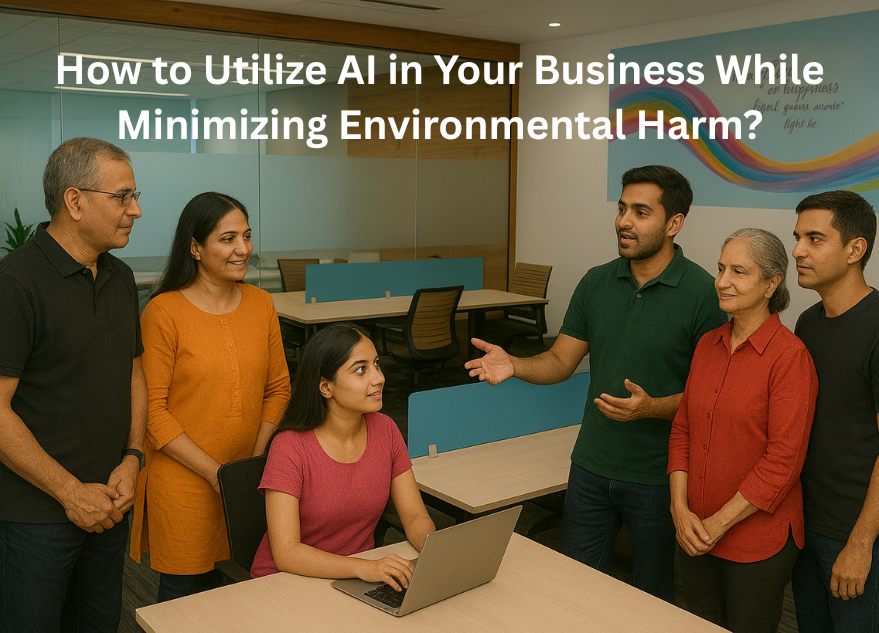Artificial Intelligence (AI) is transforming the way companies operate, innovate, and grow. However, adopting AI in business also raises concerns about environmental impact due to high energy usage and resource demand.
💡 Are you looking for Coworking space in Gurgaon, Noida or Delhi? We are just a call away. Call Now: 08999 828282
10 Practical Strategies to Use AI Effectively
- Understand the Role of AI in Business
- Choose Energy-Efficient AI Tools
- Use AI for Predictive Maintenance
- Optimize Supply Chains with AI
- Adopt Cloud-Based AI Solutions
- Implement AI for Waste Reduction
- Train AI Models Responsibly
- Use AI to Monitor Environmental Impact
- Educate Teams on Sustainable AI Practices
- Partner with Green AI Vendors
1. Understand the Role of AI in Business
AI in business is not just about automation—it’s about smarter decision-making. It can optimize marketing, streamline operations, and improve customer experiences. However, it’s important to choose tools that match your company’s size and needs to avoid wasting resources. Many small businesses think AI is only for large corporations, but AI for small businesses is now widely accessible. By starting small and scaling carefully, you can enjoy business growth without unnecessary environmental costs. This approach reduces waste and ensures you only invest in AI applications in business that truly add value.

2. Choose Energy-Efficient AI Tools
One of the main environmental concerns with AI is its high energy consumption. When looking for the best AI for business, check if the provider offers energy-efficient solutions or uses renewable-powered data centers. Many cloud service providers now highlight their sustainability practices. Using AI in business doesn’t have to mean increasing your carbon footprint—choose providers who are transparent about energy usage. Energy-efficient AI also lowers your operating costs while helping you contribute to a cleaner environment.
3. Use AI for Predictive Maintenance
AI and business go hand-in-hand when it comes to preventing waste. Predictive maintenance uses AI to monitor machinery, vehicles, or equipment and detect problems before they cause breakdowns. This reduces downtime, cuts repair costs, and avoids unnecessary production waste. For example, manufacturing companies use AI applications in business to track machine health in real time, ensuring operations run smoothly. This not only boosts productivity but also minimizes the environmental impact by extending the life of equipment and reducing material waste.
Also Read: 10 AI Tools to Build a Profitable One-Person Business
4. Optimize Supply Chains with AI
AI can make your supply chain leaner and more eco-friendly. From predicting demand to improving delivery routes, AI helps reduce fuel usage, packaging waste, and overproduction. Businesses can integrate AI-powered logistics tools to ensure they only produce and transport what is needed. Sustainable AI tools can also help track supplier sustainability ratings, ensuring your entire supply chain supports your green goals. This is especially useful for small businesses aiming to compete with larger players while maintaining eco-friendly practices.
5. Adopt Cloud-Based AI Solutions
Instead of investing in heavy in-house infrastructure, use cloud-based AI in business to cut down on hardware waste and energy costs. Cloud providers often share resources across multiple users, leading to better energy efficiency. Additionally, top cloud services are increasingly adopting green energy to run their operations. For small businesses, cloud-based tools also reduce upfront costs, making it easier to start using AI for business growth without excessive investment or environmental strain.
6. Implement AI for Waste Reduction
AI applications in business can directly help reduce waste in manufacturing, retail, and service industries. For example, AI-powered demand forecasting helps avoid overproduction in food businesses, reducing landfill waste. Similarly, AI can track product life cycles and suggest recycling or reusing opportunities. Using AI in business this way aligns with sustainable AI principles, ensuring that technological advancements work hand-in-hand with environmental goals. This is an effective way to balance profitability and eco-consciousness.
7. Train AI Models Responsibly
Training large AI models consumes a lot of energy. Businesses can reduce this impact by using pre-trained models and fine-tuning them for specific needs instead of starting from scratch. Many providers now offer smaller, more efficient AI models that still deliver great performance. By taking this approach, companies can benefit from AI and business growth while minimizing environmental harm. Responsible AI training is a growing part of sustainable AI strategies worldwide.
8. Use AI to Monitor Environmental Impact
AI is not just a business growth tool—it can also measure and improve your sustainability performance. AI tools can track energy use, water consumption, and waste output in real time. By gathering accurate data, businesses can make informed changes to reduce their environmental footprint. This is particularly valuable for industries with high resource usage, as AI and environment monitoring helps ensure compliance with sustainability regulations while improving brand reputation.
💡 Are you looking for Coworking space in Gurgaon, Noida or Delhi? We are just a call away. Call Now: 08999 828282
9. Educate Teams on Sustainable AI Practices
Introducing AI in business is more effective when employees understand how to use it responsibly. Offer training sessions on energy-efficient usage, waste reduction, and the benefits of sustainable AI. When your team understands the environmental side of AI, they are more likely to use it thoughtfully. This ensures that AI applications in business are not only profitable but also aligned with your company’s eco-friendly vision.
10. Partner with Green AI Vendors
When selecting vendors for AI solutions, consider their environmental commitments. Some providers focus on sustainable AI by reducing carbon emissions, using renewable energy, and designing low-power AI chips. Choosing such partners ensures your business growth is supported by responsible technology. Small businesses can stand out by promoting their partnerships with eco-conscious AI providers, showing customers they care about both innovation and the planet.
In conclusion, leveraging AI in business doesn’t have to come at the cost of the environment. By choosing energy-efficient tools, optimizing processes, and adopting sustainable practices, companies can unlock the power of AI while staying eco-conscious. For startups and growing businesses, working in a flexible and collaborative space can further reduce their carbon footprint. The Office Pass (TOP) offers shared and managed office spaces that promote productivity and sustainability. Ready to grow your business the smart and green way? Contact TOP at 8999 828282 today!
Frequently Asked Questions (FAQs)
Question: What is the role of AI in business?
Answer: AI in business helps companies automate tasks, analyze data, predict trends, and improve decision-making. It can boost efficiency, enhance customer service, and reduce costs. From marketing to operations, AI applications in business are becoming essential for staying competitive.
Question: How can AI be sustainable?
Answer: Sustainable AI involves using energy-efficient tools, renewable-powered data centers, and responsible model training. It focuses on reducing the environmental footprint while delivering business value.
Question: Is AI only for big companies?
Answer: No. AI for small businesses is more accessible than ever, thanks to affordable cloud-based tools and ready-to-use applications. These solutions allow small companies to compete with larger players without heavy investment.
Question: How does AI affect the environment?
Answer: AI can have a high carbon footprint due to energy-intensive data processing and training. However, it can also help reduce environmental harm by optimizing processes, reducing waste, and improving resource efficiency.
Question: What are the best AI tools for small businesses?
Answer: The best AI for business depends on your needs. Popular options include AI-powered CRM tools, chatbots, predictive analytics software, and supply chain optimizers. Cloud-based tools are especially suitable for small businesses.
Question: How can AI reduce waste in business?
Answer: AI can predict demand, monitor product life cycles, and suggest recycling or reuse opportunities. In retail and manufacturing, this prevents overproduction and reduces landfill waste.
Question: Can AI help monitor my company’s environmental impact?
Answer: Yes. AI tools can track energy usage, emissions, and waste output, providing real-time insights for improvement. This supports compliance and helps achieve sustainability goals.
Question: How do I train AI without harming the environment?
Answer: Use pre-trained models and fine-tune them for your specific needs. This requires far less energy than training from scratch and still delivers high-quality results.
Question: Why should I choose eco-conscious AI vendors?
Answer: Green AI vendors use renewable energy, optimize hardware for low power use, and design solutions with sustainability in mind. Partnering with them ensures your AI strategy aligns with environmental goals.
Question: Is sustainable AI more expensive?
Answer: Not necessarily. While some solutions may have higher initial costs, energy efficiency and reduced waste often lead to long-term savings. Plus, eco-conscious practices can improve brand image and customer loyalty.



